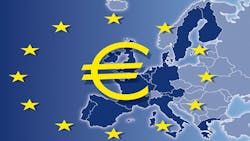BRUSSELS – Private business activity in the eurozone in February was not as bad as first feared but still showed the economic slump deepening, a key survey showed Tuesday.
The Purchasing Managers' Composite Index published by London-based Markit stood at a revised 47.9 in February, up from the initial reading of 47.3 but still well down from 48.6 in January and further away from the boom-bust line of 50.
The reading "signaled a steepening of the downturn in business activity, contrasting with the easing trend which had been evident in the three months to January," Markit said in a statement.
At the same time, the data showed a rate of decline that was "less severe than seen in any of the nine months prior to January," it said.
Chris Williamson, Markit chief economist said the outcome was "a disappointment" but the figures suggested the eurozone economy would shrink 0.2% in the first quarter, better than 0.6% contraction seen in the three months to December.
Williamson noted with concern the "divergence between Germany and France so far this year is the widest in the 15-year survey history.
"Germany is on course to see the strongest quarterly growth since (early) 2011 but France is contracting at the fastest rate for four years," he said.
The PMI for Germany came in at 53.3 while France was on 43.1 in February.
Williamson noted too that the rate of decline accelerated in Spain and in Italy, where inconclusive recent elections may prove negative for growth.
"The outlook therefore seems to largely depend on whether Germany can continue to expand and offset the weakness in France, Italy and Spain, which seems a tall order," he said.
Copyright Agence France-Presse, 2013
About the Author
Agence France-Presse
Copyright Agence France-Presse, 2002-2025. AFP text, photos, graphics and logos shall not be reproduced, published, broadcast, rewritten for broadcast or publication or redistributed directly or indirectly in any medium. AFP shall not be held liable for any delays, inaccuracies, errors or omissions in any AFP content, or for any actions taken in consequence.
